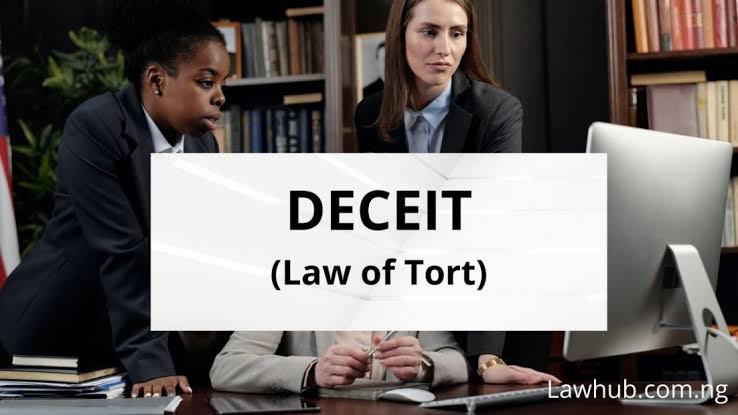N.B. This article is particular to Nigeria.
Deceit
We have seen that the rule in Hedley bryne & co V. Heller & partner Ltd, a person who makes a careless misstatement to another may be liable to that other in negligence or loss suffered as a result of reliance upon the misstatement. The tort of deceit is also concerned with the loss sustained through reliance upon misstatement but un this tort it is not sufficient to show that the defendant’s statement either knowing it to be false or being indifferent to its truth or falsity as illustrated in Derry V. Peek.
The essence of deceit is fraud and in law of contract it is known as Fraudulent misrepresentation. Unlike liability under the Hedley bryne’s principle, which is of comparatively recent origin, the tort of deceit has been established since 1789 in parsley V. Freeman and its principles are comparatively well settled & clearly drawn. The representation can be an act, a conduct or an oral statement.
ELEMENTS OF DECEIT
- That the defendant made a false representation of facts by words or conduct
- That the plaintiff relied on such false representation
- That the defendant intended that the representation be acted upon by the plaintiff
- That the plaintiff did rely on the statement & suffered damages as a result.
FALSE REPRESENTATION OF FACT
There are 3 aspects to this requirement, they include:
i. The false statement may be made by words, spoken & written, however, any conduct designed to deceive another to believe that a certain fact exists is equivalent in law to a statement that such fact actually exists.
A Nigerian case is that of James V. Mid-motors (Nig) co Ltd.
ii. Generally, the mere non-disclosure if the truth us not actionable deceit. In other words, silence does not normally constitute fraud. This principle is most seen clearly in the context of sales of goods. This is expressed in the Latin Maxim “Caveat emptor” which implies, Let the buyer be aware.
However, silence will constitute deceit in the following circumstances
A. Where it distorts a positive representation
B. Where there is active concealment of fact
C. Where a duty of disclosure is imposed by statute.
INTENTION THAT THE STATEMENT SHOULD BE RELIED UPON
The plaintiff in action for deceit must show that the defendant intended that the plaintiff relied on the defendant statement. It is not sufficient to show merely that the defendant should have realized that it was likely that the plaintiff would rely on the statement. It is also not vital that the statement be addressed directly to the plaintiff. It is sufficient that it was addressed to a third party with intent that it be communicated to the plaintiff. This is evident in Langridge V. Levy.
RELIANCE BY THE PLAINTIFF
The plaintiff must show that the defendants false representation caused him to act to his detriment as seen in Smith V. Chadwick. If the loss suffered by the plaintiff was due to some cause other than reliance upon the defendant’s misstatement, then the defendant will not be liable in deceit.
DAMAGES SUFFERED
Deceit is not actionable per se and so the plaintiff must prove he has suffered some actual damages. In most cases the damage will consist in financial loss bit there is nothing to prevent recovery for damages to property as evident in Mullet V. Mason.
DEFENSE
- Where the party that made representation made it in good faith & honest belief in its truth.
- Improper investigation by the independent contractor
- The agent doing an act outside the scope of his employment
REMEDIES
- Awards of damages
- Restitution
Contributed by: Abdulganiyu Ismail (AKA) Mastermind
Prepared and Written by: Ucheakonam Chijioke Joshua (CJ)


Leave a Reply